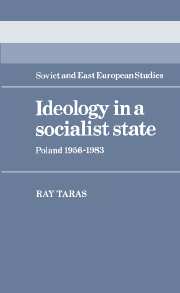Book contents
- Frontmatter
- Contents
- Preface
- 1 The concept of ideology and Western sociology
- 2 Approaches to the study of ideology in a socialist state
- 3 The Polish road: fact and fable, 1956–59
- 4 Little stabilisation and great upheaval, 1960–70
- 5 Prosperity and political style in the second Poland, 1971–75
- 6 Propaganda of success and prognoses of failure, 1976–80
- 7 Interlude I: Solidarity, 1980–81
- 8 Interlude II: martial law, 1981–82
- 9 Operative ideology, fundamental principles and social reality
- Appendix: Central Committee Plenum meetings, Party Congresses and National Party Conferences, 1956–83
- Notes
- Bibliography
- Index
3 - The Polish road: fact and fable, 1956–59
Published online by Cambridge University Press: 21 September 2009
- Frontmatter
- Contents
- Preface
- 1 The concept of ideology and Western sociology
- 2 Approaches to the study of ideology in a socialist state
- 3 The Polish road: fact and fable, 1956–59
- 4 Little stabilisation and great upheaval, 1960–70
- 5 Prosperity and political style in the second Poland, 1971–75
- 6 Propaganda of success and prognoses of failure, 1976–80
- 7 Interlude I: Solidarity, 1980–81
- 8 Interlude II: martial law, 1981–82
- 9 Operative ideology, fundamental principles and social reality
- Appendix: Central Committee Plenum meetings, Party Congresses and National Party Conferences, 1956–83
- Notes
- Bibliography
- Index
Summary
Let us imagine for a moment, comrades, that a film has been made in which somebody has shown how socialist Poland became industrialised during those years, how the socialist structure grew, how employment increased. And now let us imagine that we are screening that film in reverse, that Zeran vanishes from the outskirts of Warsaw and the Nowa Huta iron and steel works from the fields on the outskirts of Kraków; that Wierzbica, Kedzierzyn, Jaworzno and Skawina disappear; that the Bierut steel works in Czestochowa shrink to its pre-war size and that the blast furnaces built in Silesia fade away as do the chemical works at Oswiecim; that the coke works are erased and the shipyards shrivel; that millions of peasants employed in the course of the industrialisation return to their villages around Warsaw and Cracow; that the towns become crowded with unemployed; that the number of colleges and vocational schools decreases; that the many thousands of peasant sons and daughters – now among the educated intelligentsia – retreat to the villages and remain on their farms; that millions of illiterates await that their descendants, begotten in backwardness, be taught to read and write in the year 2,000, as promised by the pre-war Polish government which might as well not keep its promise; that the amount of published books diminishes, while more and more people crawl on their knees in pilgrimages so that God might reward them for their cruel fate on this earth.
- Type
- Chapter
- Information
- Ideology in a Socialist StatePoland 1956–1983, pp. 46 - 71Publisher: Cambridge University PressPrint publication year: 1984



